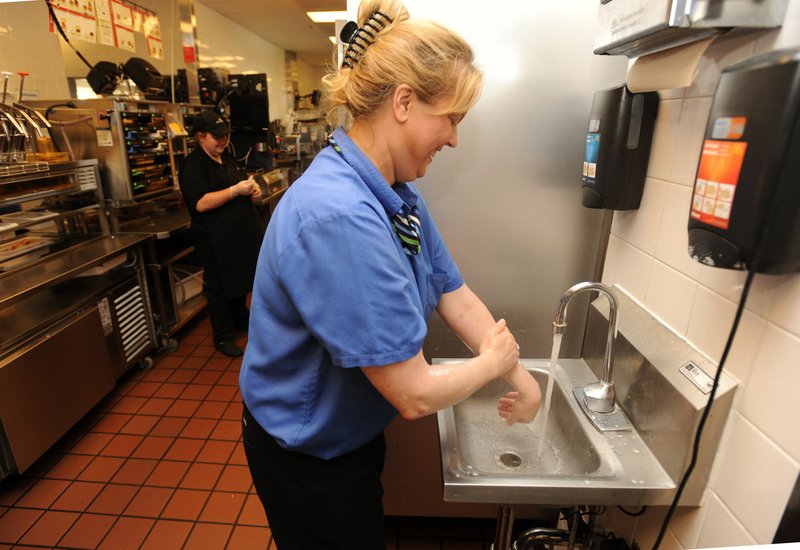The restaurant food most likely to make you sick probably isn't what you think, said Cary Gray with the Arkansas Department of Health.
"People think sushi's the riskiest food, but the thing we keep an eye on the most is rice," said Gray, the agency's Northwest regional food specialist.
By the numbers
Food establishments inspected by state Department of Health and how often, as of Friday:
Benton County
• Once a year: 324
• Twice a year:802
• Three times a year: 40
Total: 1,166
Washington County
• Once: 327
• Twice: 809
• Thrice: 124
Total: 1,260
Source: Arkansas Department of Health
Web watch
The Health Department reports for regional restaurants are available online through the Northwest Arkansas Democrat-Gazette, nwadg.com.
Food violations
The Arkansas Department of Health lists food violations in two categories. Critical violations are items relating directly to factors that lead to food-borne illness and must be corrected immediately. Noncritical violations relate to maintenance of food operations and cleanliness.
Source: Staff report
The particular challenge with rice is called bacillus cereus, he said. It's almost invisible, goes dormant when refrigerated and livens up when heated to a rice-serving temperature of 100 degrees.
"It's most active at body temperature, and 100 degrees is a pretty good body temperature for us," he said.
At that temperature, the microorganism produces a toxin with no taste and no odor. Health inspectors take particular care to make sure restaurant rice is stored and then cooked properly because of those factors, he said.
No widespread incident of food-borne illness has struck Northwest Arkansas since 2006 when a salmonellosis outbreak sickened at least 89 customers of the Sushi King Restaurant at 2501 SE 14th St. in Bentonville. The restaurant closed after the outbreak. That outbreak was mainly from foods other than sushi, Gray said.
The 2006 outbreak was the last time a restaurant closed in the region for health reasons, and it was done by the business owners without an order from the Health Department.
The state doesn't fine or extract other penalties for violations because it's in the interest of a business that sells food to fix problems health inspectors identify, Gray said. There's a legal provision for the state to close a food service if it won't fix a problem, he said.
Arkansas Health Department inspectors "can push you to the limit," said Bich Pham, manager of the family owned Bucks of Asia restaurant in Fayetteville. A review of about a year's worth of health inspections showed Bucks was inspected seven times in that period, more than any other location in the region.
Those records also show much of the repeat inspections involved rice temperatures, preparing a variety of different types of food in the same locations and water leaks from restaurant equipment. All problems were fixed, the inspections show.
"They were very over-aggressive, but I have to say that we could fix anything they found right away," Pham said. "We learned a lot, and we're ready for anybody now. They could come here today or anybody could, and they wouldn't find a thing. So they do a good public service even if they do push you. I have no regrets."
Health Department inspectors check businesses that sell or serve food at least once a year. That includes businesses such as summer camps that are only open a few months a year. Even businesses that sell packaged food such as cartons or cans are inspected. Businesses that prepare food are inspected twice a year, while others that prepare more elaborate or risky foods are inspected three times a year.
Violations must be fixed immediately, and follow-up inspections are done. If the problem cannot be fixed immediately, such as a broken dishwasher that doesn't heat the water up to the required temperature, an improvised solution such as adding some bleach to dishwater before rinsing must be adopted in the meantime.
Oriental and Mexican restaurants made up six of the 10 restaurants inspected at least six times in the one-year period ending in August, according to Health Department records. The fact these restaurants serve rice as a staple item is a major contributor to that trend, Gray said.
Oriental restaurants also often serve seafood. Getting seafood to landlocked Arkansas, 465 miles from the nearest seacoast, keeping it fresh and handling it correctly are all challenges, he said.
Inspection requires much more than a check for spoiled food, Gray said.
"Most of the things that can make you sick aren't the same bacteria that spoil food," he said. "So you have to look at a lot more than whether food is spoiled. That's why the things we look for include how food is handled, whether different types of food are kept separate and whether employees have a good place to wash their hands."
The safety record in the area shows the inspections work, restaurant owners say.
"They do a good job of protecting the consumers," said Bill Mathews, who reads a lot of restaurant health inspection reports -- his own and other people's.
"When my family goes out to eat, I read what's in there" about the restaurant they are going to, Mathews said. He runs Mathews Management with his brother, Walter. The company manages 35 McDonald's restaurants in and around Northwest Arkansas.
"Being in the business, I can read those and see more of what's going on, but anyone can get good information from them," Mathews said. "The thing to look for is critical violations, things like the water for cleaning not being hot enough or stored food not being kept cold enough. Those are the things that can really cause problems."
State health inspectors are overworked and underfunded but still do an excellent job, said Joe DeVito of Harrison. DeVito is both the president of the Arkansas Restaurant Association and a partner with brothers in DeVito's Restaurant & Trout Farm in Harrison.
"A Health Department permit to operate a restaurant for a year costs $35," DeVito said. "The same permit would cost you hundreds of dollars in Missouri. We (the association) have tried to get that increased, to just double it, but we can't get legislators interested. Yet despite being overworked, inspectors do a good job and go to extra effort to teach classes and do other things to help restaurant owners and workers avoid problems."
Arkansas Health Department inspections are on par with surrounding states' practices, a comparison showed. Mississippi, Louisiana and Texas have some categories of eating establishments inspected four times a year, department spokesmen said.
The ones that get inspected the most in those states serve high-risk populations such as residents of full-service nursing homes. In Arkansas, health inspections for those facilities where the residents require full-time medical care are done by the Office of Long-Term Care, Gray said.
The Health Department does inspect food preparation at assisted-living facilities and similar facilities. The department also inspects schools, day cares and churches.
Oklahoma has a more simple "pass/fail" inspection system than Arkansas. Texas has regions where local authorities are in charge of health inspections, not the state. Some of these "home rule" regions have higher standards than the state's, a spokesman for the Texas Department said. All regions of Texas meet at least the minimum once-a-year inspection recommended by the federal Food and Drug Administration.
Tennessee has the most elaborate system of any surrounding state. Every eating establishment gets a score from 1 to 100. That number has to be posted where incoming customers can see it.
NW News on 09/18/2016


